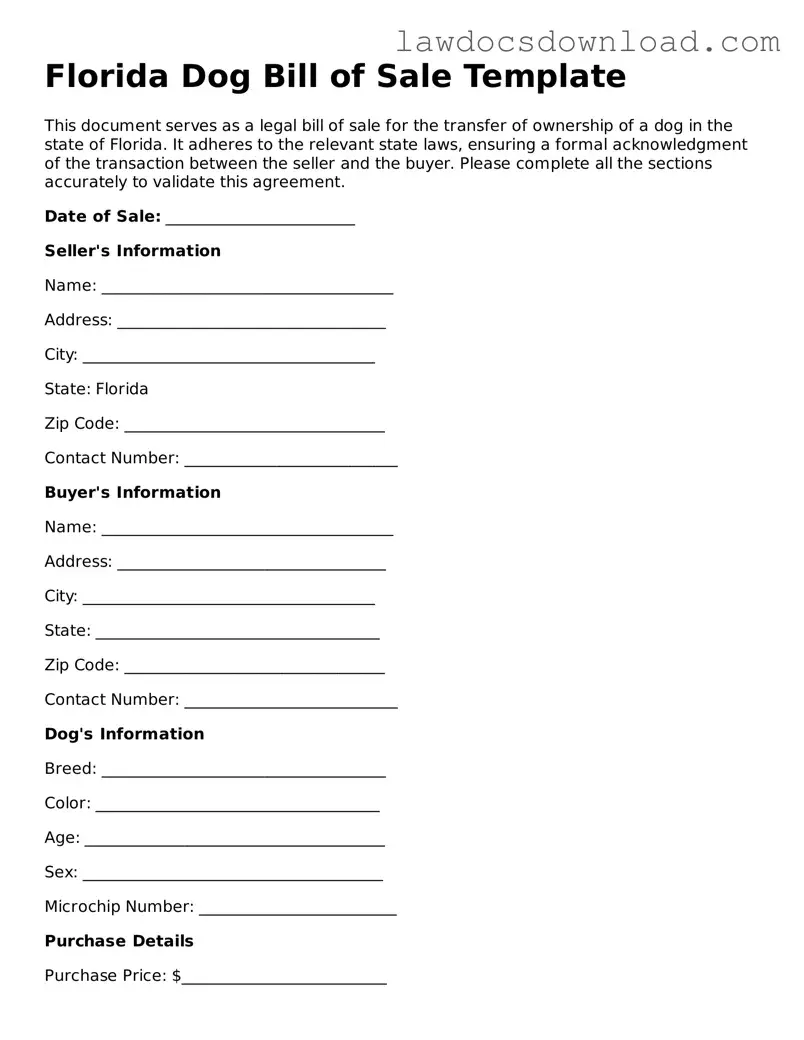The Florida Dog Bill of Sale is quite similar to a General Bill of Sale. Both documents serve the fundamental purpose of recording a transaction between two parties. They document the transfer of ownership of an item, in this case, a dog, from the seller to the buyer. These forms usually contain details about the item being sold, the sale price, and the date of sale, providing a legal acknowledgement of the transaction.
Similarly, the Vehicle Bill of Sale parallels the Dog Bill of Sale in its function of documenting the transfer of ownership, though in this instance, it pertains to vehicles. It includes specific details like make, model, year, and the vehicle identification number (VIN), alongside the sale price and date. This specificity ensures a clear understanding of what vehicle is being sold, aligning with how a Dog Bill of Sale specifies the breed, age, and any identifying details of the dog.
The Equipment Bill of Sale is another related document. It is used for transactions involving machinery or equipment, detailing the item’s condition, serial number if applicable, and other pertinent information. This emphasizes the importance of recording the specifics of the item being sold, similar to how the Dog Bill of Sale records breed-specific information and health details of the dog.
The Business Bill of Sale shares a resemblance too, as it outlines the transfer of ownership of a business. This document often includes details about the business assets being transferred, mirroring how the Dog Bill of Sale lists details about the dog, ensuring that the buyer is fully aware of what they are purchasing.
A Real Estate Bill of Sale is also comparable, though it focuses on the transfer of ownership of real property. It includes information such as the property's location, size, and purchase price. Similar to the Dog Bill of Sale, this ensures that all specifics of what is being transferred are legally recorded.
The Boat Bill of Sale, much like those mentioned above, documents the transfer of a boat from seller to buyer and details about the boat such as make, year, and registration number. This mirrors the functionality of the Dog Bill of Sale by providing a written record of the sale and specifics of the boat being sold.
A Firearm Bill of Sale is another comparable document, designed specifically for transactions involving guns. It often contains details regarding the make, model, and serial number of the firearm, underscoring the importance of detailing the specifics of the item being sold, akin to the details provided in a Dog Bill of Sale.
Similarly, an Artwork Bill of Sale captures the transaction of art pieces between parties. It includes descriptions of the artwork, the artist’s name, and the sale price. This parallels the Dog Bill of Sale’s role in documenting the specifics of the transaction, ensuring both parties have legal proof of transfer and details of the item in question.
A Livestock Bill of Sale is closely related, focusing on the sale of animals such as cattle or horses. It details the animal's breed, registration, and health information, drawing a direct comparison to the Dog Bill of Sale, which serves a similar purpose for dog transactions.
Finally, the Furniture Bill of Sale is used to document the sale of items of furniture from one party to another, detailing the condition, price, and description of the furniture sold. Like the Dog Bill of Sale, it protects both the buyer and seller by providing a written record of the transaction and specifics of the items exchanged.

